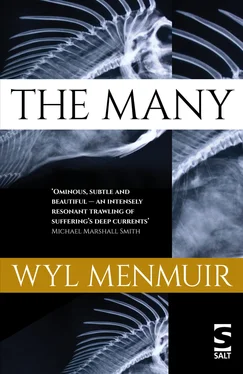Wyl Menmuir - The Many
Здесь есть возможность читать онлайн «Wyl Menmuir - The Many» весь текст электронной книги совершенно бесплатно (целиком полную версию без сокращений). В некоторых случаях можно слушать аудио, скачать через торрент в формате fb2 и присутствует краткое содержание. Год выпуска: 2016, Издательство: Salt, Жанр: Современная проза, на английском языке. Описание произведения, (предисловие) а так же отзывы посетителей доступны на портале библиотеки ЛибКат.
- Название:The Many
- Автор:
- Издательство:Salt
- Жанр:
- Год:2016
- ISBN:нет данных
- Рейтинг книги:4 / 5. Голосов: 1
-
Избранное:Добавить в избранное
- Отзывы:
-
Ваша оценка:
- 80
- 1
- 2
- 3
- 4
- 5
The Many: краткое содержание, описание и аннотация
Предлагаем к чтению аннотацию, описание, краткое содержание или предисловие (зависит от того, что написал сам автор книги «The Many»). Если вы не нашли необходимую информацию о книге — напишите в комментариях, мы постараемся отыскать её.
The Many — читать онлайн бесплатно полную книгу (весь текст) целиком
Ниже представлен текст книги, разбитый по страницам. Система сохранения места последней прочитанной страницы, позволяет с удобством читать онлайн бесплатно книгу «The Many», без необходимости каждый раз заново искать на чём Вы остановились. Поставьте закладку, и сможете в любой момент перейти на страницу, на которой закончили чтение.
Интервал:
Закладка:
In the village below, the church bells start to ring, slow and persistent, and the sound makes its way into the house and continues late into the night.
He spends the night sleeping and not sleeping on the chair and at some point he dreams. He is standing, alone, by the side of the coast road, the glare of a full and heavy moon bearing down on the sea in front of him and on the fields behind. Both the sea and the fields are still and calm under the weight of the moonlight and the reflection of the moon on the water amplifies its glare. He is waiting for something he knows is about to happen, so when it does happen, it is not a surprise. A slight movement in the water, a susurration from the fields behind, and they emerge, like some great exodus or migration of animals, pulled out of the sea by the moon all at once. They emerge in their hundreds, or perhaps in their thousands, pouring out of the sea and he cannot believe the sea is able to hold so many of them. They emerge in numbers too great for him to take in and, overwhelmed, he turns away from them, only to find they are emerging too from the barrows and are filling the fields. Perran upon Perran upon Perran. Timothy knows they are all Perran and that each one of them has within him the potential for infinite variety, though all the figures before him are faceless and featureless. At that moment he feels he knows for each of the Perrans emerging every decision each of them has made and will ever make, and still they pour forth from the sea and from the ground. They crowd towards him, not out of any knowledge of him or sense that he is there, but because they fill all the space around, and they continue to come until they block out the light from the moon, and the darkness takes him.
In the early morning, as morning light begins to make its mark on the darkness, he is able to see the full extent of the damage. The damp underfoot is the paint he had bought for the walls, poured out over the new carpets. There are tens of pairs of footprints walking through it in every direction and the paint shows the path the townsfolk took through the house and out into the garden. The curtains he had hung have been ripped from their hooks and lie on the floor, soaking up paint, and through the window he can see splintered items of furniture spread out across the grass in front of the house. He walks outside among the wreckage and beneath the large tree he finds a pile of disturbed earth and by it, in rows, the disintegrating bodies of the fish he buried a week previously. They are laid out next to one another on the ground, an array of rotting fish, pale and luminescent. Scattered around them is a halo of scales, and, as a slight breeze passes through the garden, they shift and float upwards and then back down to the ground. Timothy sits beside the fish and looks around him at the scene. After a while, he rouses himself and, after looking and not finding anything else suitable to use for the job, gets down onto his knees and uses his hands to re-excavate the hole. One by one, he replaces the fish with care in their grave and covers them over with soil.
He rises from the ground and goes back into the house where he walks from room to room again, picking up and then replacing on the floor the books he had brought with him, small and splintered pieces of furniture. It reminds him of images of the aftermath of a hurricane he once saw on the news. It feels elemental somehow, rather than something human, though the footprints throughout the house belie this thought.
He works his way through the upstairs and as he inspects the broken windows in the front bedroom he sees there is something different about the scene below, something unusual about the village in front of him. From where he is, he can see that the mouth of the cove looks like it belongs to another place altogether such is its transformation, as though it has been entirely rearranged overnight. Wanting to be anywhere but inside the house, he makes his way back downstairs and locates his spare waterproof on a hook behind the door in the kitchen. The coat has escaped the violence and he pulls it on over his clothes, and leaving the house behind him, he walks down through the village.
It is only when he comes out from between the narrow rows of houses fronting onto the beach that he sees the sea has risen overnight and the beach has been entirely drowned, though there has been no storm and no warning of high tides. The water has risen up above the height of the concrete wall that separates the beach from the village. The roof of the winch house is still visible, and sections of railing that run along the boundary between the beach and the road poke up out of the water. The café, too, is now an island floating in the sea. It looks as though it has been unhitched from the land and stays where it is only for lack of movement in the water or air. The coast road, too, is under water along the sea front, and the waves lap at the foot of the houses on the other side of the road. At either end of the submerged beach, the road rises out of the water, as though a section of it has been dipped into the dark water for treatment. As Timothy stands on the steps of one of the houses that face directly onto the sea and looks out on this newly created scene, he sees the lights of the fleet converging on the cove mouth from their night’s fishing.
Timothy looks around to see if there is anyone else there to witness the flood. At first it appears he is alone, though he sees to his left, where the coast road emerges from the water, a blue car with dark-tinted windows is slowing to a halt just a few feet from the water. As he watches, the passenger door opens and a figure steps out of the car. It is the woman and, though she looks straight towards him, if she sees him she does not acknowledge it. She looks perturbed by what she sees and she stands for a while examining the scene. Timothy waits and watches for her to get back into the car and reverse up the hill on the narrow road, but she remains where she is, as though she is trying to unravel a complex problem.
He plays through in his mind a scenario in which each morning he wakes to find the sea has risen another few feet overnight and has claimed another portion of the village until it reaches Perran’s house and the waves lap at the door.
For a while, the only observers of this scene are Timothy and the woman in grey, and when the villagers start to emerge from their houses, both of them retreat, she to behind the tinted glass of the car beside which she is standing, and he to Perran’s.
When he arrives back at the house he tries to assess the damage there with a more objective eye. He walks again from room to room, righting pieces of furniture, working out which pieces he can salvage. In the living room, after lifting the large bookcase back against the wall, he picks up books from the sodden floor, their pages splayed out, as though they want to soak up as much as possible of the chaos that ran through the house the night before.
Timothy works on reclaiming the house for the rest of the day and sees no one. He assumes the rest of the village is preoccupied with the damage caused to the seafront. Working through the house, he starts to pile his newer furniture together on the patch of grass outside the front of the house that is still yellowed and flattened from the furniture he had removed from the house weeks earlier. When the pile reaches head height he fills some of the empty drawers and cupboards with newspaper and sets light to it. The chemical-soaked furniture takes quickly and burns with a dark acrid smoke that sticks to the back of Timothy’s throat. He looks down towards the beach, but the attention of the village is still turned towards the high waters below and the fire and its fume-heavy smoke go unnoticed.
As Timothy watches the fire spread he feels a strong emotion rise up within him, surging to the surface, though even as it does he knows it is not because of the damage to the house, or the hostility of the village. As the fire builds, he feeds it with the books that are beyond repair. He stands as close to the flames as he can bear in order to dry the tears as they form and wonders what he has done to bring this down on himself.
Читать дальшеИнтервал:
Закладка:
Похожие книги на «The Many»
Представляем Вашему вниманию похожие книги на «The Many» списком для выбора. Мы отобрали схожую по названию и смыслу литературу в надежде предоставить читателям больше вариантов отыскать новые, интересные, ещё непрочитанные произведения.
Обсуждение, отзывы о книге «The Many» и просто собственные мнения читателей. Оставьте ваши комментарии, напишите, что Вы думаете о произведении, его смысле или главных героях. Укажите что конкретно понравилось, а что нет, и почему Вы так считаете.











